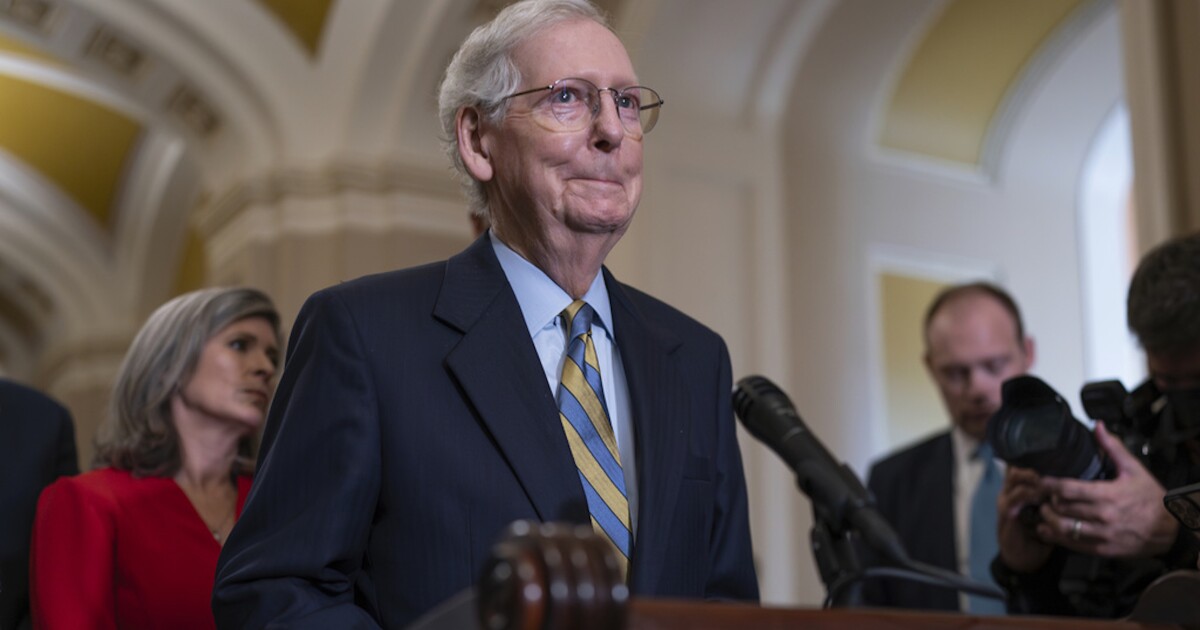

Sen. Joe Manchin’s (D-WV) decision to not seek reelection was a major victory in Senate Minority Leader Mitch McConnell’s (R-KY) prolonged campaign to retake control of the upper chamber.
Democrats currently control the Senate by a 51-49 margin, meaning Republicans only need to net two seats to win back control. McConnell has worked since last year on recruiting the most electable candidates in must-win swing states in hopes of avoiding a repeat of Republicans’ disappointing performance in the 2022 midterms.
REPUBLICAN DEBATE: ONLY ONE THING MATTERS AFTER GOP BRAWL IN MIAMI
Manchin is a centrist Democrat in a deep red state who was widely viewed as the most vulnerable Senate incumbent of the 2024 cycle. Speculation mounted in recent months about the West Virginia senator’s political future as poll after poll indicated that he was trailing his leading GOP challenger, Gov. Jim Justice (R-WV).
If Manchin had run, and if Justice wins his primary as polls suggest he will, it would have been the most expensive contest of the cycle for both sides. McConnell and Sen. Steve Daines (R-MT), who chairs the National Republican Senatorial Committee this cycle, had listed West Virginia as the top target in their broader strategy to reclaim the Senate majority.
Manchin’s Thursday announcement capped off McConnell’s yearlong effort to get the coveted seat back in Republican hands, which included him quietly traveling to West Virginia in late 2022 to encourage Justice to get in the race, a source familiar with the matter tells the Washington Examiner.
Asked about Justice and securing Senate control in an interview late Thursday, McConnell said, “You can do the math. If we don’t lose any incumbent — and I don’t think we will — he’s No. 50. And one step closer to having a majority. I’ve been involved in a lot of recruiting over the years, some successfully, some not. But I think that’s the best recruiting job I ever did.”
Democrats have no current path to victory in West Virginia without Manchin in the race, so the party will need to look to other swing states to hold on to its slim Senate majority. Representatives for the campaign arms for Senate Democrats and Republicans acknowledged as much in their reactions to Manchin’s announcement.
“Democrats have multiple pathways to protect and strengthen our Senate majority and are in a strong position to achieve this goal,” David Bergstein, a spokesman for the Democratic Senatorial Campaign Committee, said on Thursday. “In addition to defending our battle-tested incumbents, we’ve already expanded the battleground map to Texas and Florida, where formidable Democratic candidates are outraising unpopular Republican incumbents and the DSCC is making investments to lay the groundwork for our campaigns’ victories.”
The NRSC, meanwhile, said, “We like our odds in West Virginia.”
With Manchin out of the picture, the onus of protecting Democrats’ Senate majority will fall on three swing-state incumbents: Sens. Jon Tester (D-MT), Sherrod Brown (D-OH), and Bob Casey (D-PA).
McConnell’s campaign for Senate control has not been all smooth sailing. He urged Republicans to coalesce around Navy SEAL Tim Sheehy in the Montana GOP primary to challenge Tester, though that has failed to dissuade Rep. Matt Rosendale (R-MT), who is expected to get in the race.
CLICK HERE TO READ MORE FROM THE WASHINGTON EXAMINER
The party establishment has said Rosendale’s 2018 loss to Tester proves he cannot win statewide, and GOP leadership views the seat within reach given that former President Donald Trump carried the state by over 16 points in 2020. A competitive primary could weaken leadership’s chosen candidate in the general election and allow Tester to hold onto his seat.
Democrats will also face pressure to allocate resources previously reserved for West Virginia to ousting incumbent Republicans like Sens. Ted Cruz (R-TX) and Rick Scott (R-FL), both of whom are running in states where Democrats have struggled in recent statewide contests.





